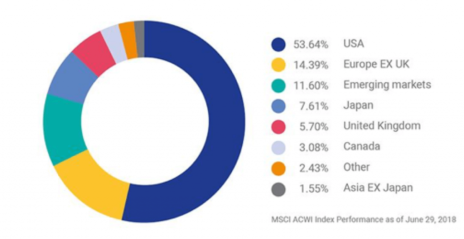U.S. Stocks Make Up a Majority of the Global Stock Market. That Will Change Drastically in the Years Ahead.
In my constant search for great global stocks, international travel is a big part of my life. And no matter how interesting it is for me to travel overseas exploring new investment opportunities for you, there is a special feeling when I return to America.
For one thing, the air is a lot cleaner. It’s also nice to put my head down on my own pillow and get back to my normal routine and all the familiar surroundings.
In much the same way, investors also feel more comfortable putting money to work in companies close to home. The technical term for this is “home bias,” and researchers find that one persistent trend in investing is the inclination by investors to favor their home stock market.
[text_ad]
One team of researchers (Coval & Moskowitz, 1999) even found investor preference for companies located in their home city or state.
I think it’s great that investors back local companies where they shop or where their friends work. But when you really think about it, this home bias is puzzling. Why should the world’s best companies with the best growth prospects just happen to be in America or wherever your home country happens to be?
The Value Gap
I would be the first to admit that imploring investors to diversify into international and emerging market stocks is a tough sell when U.S. markets are reaching all-time highs after a decade-old bull run.
As you can see from the chart below, that bull market has resulted in U.S.-listed companies accounting for an astounding 54% of the value of all the world’s stock markets. That’s remarkable considering that America represents only 5% of the world’s population.
In sharp contrast, the total value of emerging market stock markets is only 12% of the world’s total despite the fact that they account for 85% of the world’s population. And keep in mind that in 1989, Japanese stocks represented 30% of world stock markets, but now sit at less than 8%.
When America represented more than half of the world’s economy and American multinationals virtually dominated world markets, home bias made more sense. But while America’s economy is still larger than China’s and almost three times that of former rival Japan, we now live in a different, more global world due to incredible jumps in technology and communications.
In short, where a company is based means less and less; what it does and how it performs are what matter now.
This is especially true for emerging markets, as the value of their stock markets play catch-up to their contribution to global economic growth and share of the global economy.
While no one can predict how markets will move going forward, it seems smart to start taking some of your profits and adding more overseas exposure to your portfolio.
My opinion is that, though it won’t be anything resembling a straight line, over time the market value gap between U.S. stocks and other global stocks will narrow.
Where to Find the Best Global Stocks
The time to buy overseas stocks is now, but the strategy you use to take advantage of this mismatch is critical.
Move incrementally and buy emerging markets when they are down and out. Stick with high-quality companies showing good growth and strong balance sheets. Diversify across many countries and favor those that respect private capital, rule of law, and open markets.
Also keep in mind that the best way to capture the growth and upside potential of overseas and emerging market stocks is through old-fashioned, bottoms-up stock picking.
This is the mission of my Cabot Global Stocks Explorer advisory.
We offer a portfolio of specific global stocks across the risk spectrum as well as new strategies and intelligence on what is happening on the ground. One of our ideas, Singapore-based Sea Limited (SEA), has more than tripled in value so far in 2019.
Some of the investment themes and ideas we are pursuing include:
- Growth of mobile e-commerce and services
- An expanding, consumer-driven middle class in Asia
- Expanding demand for financial services and fintech
- Soaring demand for air travel in Asia and emerging markets
- Rare metal and rare earth resource plays
- Semiconductors for artificial intelligence, cloud computing and robotics
Get comfortable with a smart global portfolio and watch it grow. The years ahead should be great times for investors in global stocks.
If you want to take advantage of those great times and invest globally, but think you could use some extra guidance in doing so, I urge you to become a Cabot Global Stocks Explorer subscriber by clicking here.
[author_ad]


